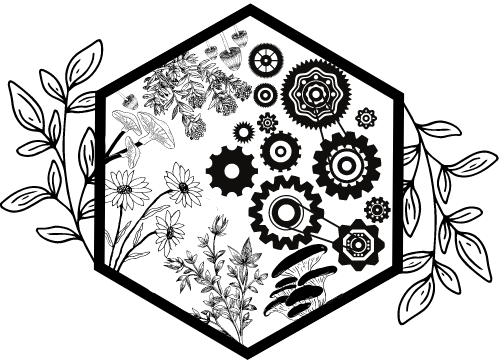Ecological Ideas
What is permaculture?
Permaculture is a design philosophy and practice aimed at creating sustainable and self-sufficient ecosystems by mimicking natural processes. The term “permaculture” combines “permanent agriculture” and “permanent culture,” reflecting its focus on both sustainable farming practices and the creation of enduring, harmonious human societies. The core principles of permaculture begin with observing and interacting with the natural environment. Understanding how nature functions is essential for designing systems that work in harmony with natural processes rather than against them. Another important principle is catching and storing energy effectively. This can involve harnessing solar, wind, or water energy and using systems like rainwater harvesting or solar panels to build resilience and sustainability. The goal of permaculture systems is to produce a yield, which means that they should give resources, energy, or food to meet the requirements of the people using them. It is imperative to maintain the productivity and efficiency of the system. Systems should also accept feedback and exercise self-regulation. This implies that in order to minimize adverse effects and increase resilience, they must be flexible and able to continuously develop. Another fundamental idea is the use and valuation of renewable resources and services. Permaculture contributes to sustainability by giving non-renewable resources like sunlight and wind priority over them. The significance of natural services like pollination and nutrient cycling is also emphasized by this notion. At the core of permaculture, where waste is viewed as a resource, is the idea of producing no waste. Closed-loop systems are produced by recycling and reusing nutrients and materials, so everything has a purpose. Understanding natural patterns and principles is the first step in permaculture design before focusing on particular details. Systems are made sure to be both detailed and comprehensive by using this holistic approach. Efficiency and effectiveness are increased when components of a system are integrated rather than separated. For instance, combining pest-repelling plants with crops helps cut down on the amount of chemicals used. Using slow, tiny solutions is another essential permaculture practice. Large-scale interventions are frequently more difficult to manage and less sustainable than small-scale, incremental changes. This theory favours little steps forward and regional fixes. Appreciating the diversity of flora, fauna, and human populations boosts the system’s resilience. Diverse ecosystems can adjust to changes more easily and are less vulnerable to disease and pests. Utilizing edges and appreciating the marginal stresses that boundaries like the intersection of a field and a forest are frequently the most productive places in natural systems. These margins are exploited by permaculture to boost diversity and productivity. Finally, since change is unavoidable, it is crucial to use it creatively and adapt to it. Innovative adaptation and reaction to changing situations are encouraged by permaculture. The concepts of permaculture can be used in a variety of settings. In order to improve soil health, lessen pests, and boost productivity, they entail creating gardens and farms that resemble natural ecosystems, such as agroforestry systems and polycultures. Permaculture landscaping incorporates native plants and water management techniques like rain gardens and swales to create visually beautiful and ecologically sound landscapes. Through community gardens, green roofs, and sustainable architecture, permaculture concepts are applied to urban design in order to enhance quality of life and resistance to urban changes. Another important application of permaculture ethics and principles is community building, where they are used to develop cooperative, resilient communities that benefit both the environment and people. There are three main ethics that guide permaculture. In order to maintain the health and lifespan of the globe and its ecosystems, earth care is required. The goal of people care is to provide for people’s needs in a just and equitable way. Fair Share places a strong emphasis on sensibly allocating surplus and resources to ensure that there is enough for everyone and that the system stays balanced. Beyond farming and gardening, permaculture is an all-encompassing way of living sustainably and in balance with the natural world. To create resilient systems that are advantageous to both humans and the environment, it combines ecological design, workable solutions, and moral considerations.
Address
1234 Divi St. #1000
San Francisco, CA 39325
Get Directions
Library Hours
Thurs – Sat : 10am – 6pm
Sun : Closed
Mon – Wed : 10am – 8pm
Contact Us
(235) 462-4623
info@divilibrary.com
